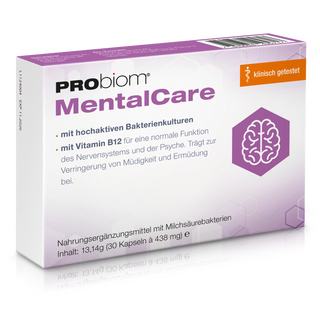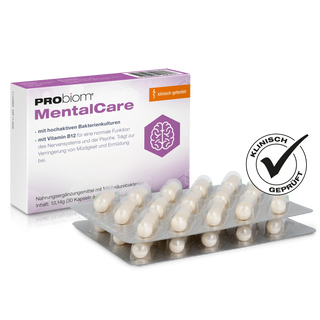When we think of happiness, we often think of the brain, positive thoughts, or happiness hormones like dopamine and serotonin. What many people don't know is that around 90 percent of the serotonin in our body isn't produced in the brain, but in the gut. This astonishing fact shows how closely our physical and mental health are connected. In this article, you'll learn how the gut becomes a catalyst for happiness, which processes play a role in this, and how you can actively influence your mood.
Serotonin: The key to emotional balance
Serotonin is a neurotransmitter that acts in many areas of the body. Its most well-known role is in the central nervous system, where it stabilizes mood, reduces anxiety, and provides a sense of inner calm. However, serotonin is also responsible for many bodily processes, such as the sleep-wake cycle, pain processing, appetite regulation, and bowel motility.
Contrary to popular belief, serotonin is not primarily produced in the brain. In fact, the gut, or more specifically the enterochromaffin cells of the intestinal mucosa, produces about 90% of all serotonin in the human body. This serotonin does not reach the brain directly, but it has a tremendous influence on the nervous system via the so-called gut-brain-nerve network.
The gut-brain axis: communication in two ways
The so-called gut-brain axis describes the close connection between the gastrointestinal tract and the central nervous system. This communication runs in both directions: The gut sends information to the brain and vice versa. This connection functions via the enteric nervous system, often referred to as the "gut brain," as well as chemical messengers such as serotonin.
A disturbed balance in this system can negatively impact both digestion and mood. Irritable bowel syndrome, anxiety disorders, and depression are often associated with an imbalance in the gut-brain axis. This means that when the gut is unwell, the soul often suffers as well.
The microbiome: Your inner roommates as lucky charms
The microbiome—the community of billions of bacteria that live in our gut—plays a central role in serotonin production. Certain bacterial strains are capable of synthesizing serotonin precursors or stimulating serotonin production. Studies show that people with a diverse and healthy gut flora are less likely to suffer from depression and have a more stable emotional state.
The balance of microorganisms is particularly important: An overgrowth of harmful bacteria (e.g., due to antibiotics, stress, or an unhealthy diet) can disrupt the balance and inhibit the production of feel-good hormones. Probiotic foods, a high-fiber diet, and fermented products can help restore the microbiome's balance.
Tryptophan: The precursor of serotonin
To produce serotonin, the body needs an amino acid called tryptophan. This essential amino acid cannot be produced by the body itself and must be obtained through food. Good sources of tryptophan include nuts, seeds, oatmeal, chicken, eggs, bananas, dark chocolate, and legumes.
Interestingly, tryptophan competes with other amino acids for brain absorption. Therefore, combining it with carbohydrates can be helpful in promoting tryptophan absorption. A balanced meal with protein and complex carbohydrates is therefore not only good for satiety but also for your emotional balance.
Stress, sleep and exercise: Lifestyle factors for your happy gut
In addition to diet, lifestyle factors also influence serotonin production. Chronic stress can lead to overload of the hormonal axes and imbalance the gut. Cortisol, the stress hormone, promotes inflammation and disrupts the balance in the microbiome.
Adequate sleep, regular exercise, and targeted relaxation techniques such as yoga, meditation, or breathing exercises can help positively influence serotonin levels. Studies show that just 30 minutes of moderate exercise daily can measurably increase serotonin release.
Recognizing serotonin deficiency: symptoms and causes
A serotonin deficiency can manifest itself in a variety of ways. Typical symptoms include:
-
lack of motivation
-
irritability
-
Sleep problems
-
Feelings of anxiety
-
Depression
-
Indigestion
-
Cravings for sweets or carbohydrates
The causes of low serotonin levels are complex. In addition to genetic factors, an unbalanced diet, chronic stress, insufficient sunlight, lack of exercise, and microbiome disturbances play a key role.
Practical tips: How to support your gut in serotonin production
-
Eat a diet rich in fiber with plenty of fruits, vegetables, whole grains and legumes.
-
Incorporate probiotic foods such as yogurt, kefir, sauerkraut or kimchi into your daily routine.
-
Avoid excessive sugar intake and processed foods, which can disrupt the microbiome.
-
Make sure you get enough sleep , ideally 7-8 hours per night.
-
Exercise regularly , preferably in the fresh air.
-
Consciously take breaks and reduce stress through meditation, mindfulness or breathing exercises.
-
Use the power of daylight , because sunlight promotes serotonin production.
Conclusion: Your gut as the key to happiness
The realization that our gut produces 90 percent of the happiness hormone serotonin opens up new perspectives on our health. Our emotional well-being depends not only on our heads, but also, to a large extent, on our gut. With the right diet, a healthy lifestyle, and conscious care of your microbiome, you can actively influence your mood and give your happiness a boost.
Thus, the phrase "listen to your gut feeling" becomes not just a metaphor, but a scientifically based strategy for more joy in life and inner balance.













